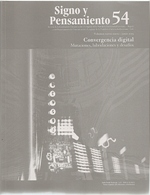Abstract
This article condenses a part of the theoretical framework developed by the authors for the analysis of digital TV, in which one can also find a more extensive examination of the history of the development of this technology in Brazil and in the world, in the perspective of the Political Economy of Communication. In this text the option is made to present the state of the art of debates about the Internet, convergence and its impacts on the telecommunications and television economy, as well as to advance in the discussion on the democratization of communications, based on considerations about culture and public space.
— (1997), La génesis de la esfera publica global. Nueva Sociedad, Caracas, n. 147, p. 88-95, jan./fev. 1997.
— (1999), (Org.). Globalização e Regionalização das Comunicações. São Paulo: educ. — (2002), Trabalho intelectual, comunicação e capitalismo. Revista da Sociedade Brasileira de Economia Política, Rio de Janeiro, n. 11, p. 53-78, DEZ. 2002.
—; Brittos, V. (2007), A televisão brasileira na era digital: exclusão, esfera pública e movimentos estruturantes. São Paulo: Paulus.
Brecht, B. (2003), Teorias de la radio. EPTIC On Line - Revista de Economía Política de las Tecnologías de la Información y Comunicación, Aracaju, v. 5, n. 2, maio-ago. 2003. Disponível em: . Acesso em: 22 mar. 2003.
Brittos, V. (2001), Recepção e tv a cabo: a força da cultura local. 2. ed. São Leopoldo.
Bustamante, E. (1999), La televisión digital: referencias básicas. In: Bustamante, E;
Monzoncillo, J. (Orgs.), Presente y futuro de la television digital. Madrid: Edipo, p. 21-32.
Chesnais, F. (1996), A mundialização do capital. São Paulo: Xamã.
Diniz, E. (1978), Empresário, Estado e capitalismo no Brasil: 1930/1945. Rio de Janeiro: Paz e Terra.
Garnham, N. (1999), El desarrollo del multimedia: un desplazamiento de la correlación. In: Bustamante, E; Monzoncillo, J. (Orgs.), Presente y futuro de la television digital. Madrid: Edipo, p. 297-314.
Habermas, J. (1984). Mudança estrutural da esfera pública. Rio de Janeiro: Tempo Brasileiro.
Hercovici, A.; Bolaño, C.; Castañeda, M.; Vasconcelos, D. (2007), Economia Política da internet. Aracaju: Editora UFS.
Herscovici, A. (1995). Economia da cultura e da comunicação. Vitória: Fundação Ceciliano A. de Almeida, UFES.
Huet, A. (et al) (1978). Capitalisme et Industries Culturelles. Crenoble: PUG. Lafrance, J. (1999). La televisión del siglo XXI: será o no será! In: In: Bustamante, E; Monzoncillo, J. (Orgs.), Presente y futuro de la television digital. Madrid: Edipo, p. 283-295.
Miège, B.; Pajon, Patrick; Salaün, Jean-Michel. (1986), L’industrialisation de l’áudiovisuel: des programmes pour les nouveaux médias. Paris: Aubier.
Ministério da ciência e tecnologia. Informática e telecomunicações no Brasil. Disponível em: http://www.mct.gov.br/Temas/Socinfo/Livro_Verde/cao3.pdf Acesso em: 5 out. 2004.
Ministério da ciência e tecnologia. Livro Verde da Sociedade da Informação no Brasil. Disponível em: http:// www.mct.gov.br. Acesso em: 20 maio 2003.
Phan, d; n’guyen, g. (1999). Economie des Télécommunications et de l’Iternet. Disponível em: www-eco.enst-bretagne.fr/biblio/ecotel.pdf Acesso em: 14 dez. 1999.
Santos, B. (2000). A crítica da razão indolente: contra o desperdício da experiência. Porto: Afrontamento.
Tremblay, G. (1995). La théorie des industries culturelles face aux progrès de la numérisation et de la convergence. In: Lacroix, Jean-Guy; Tremblay, Gaëtan (Orgs.). Les autoroutes de l’information: un produit de la convergence. Sainte-Foy: Presses de l’Université du Québec.
Zallo, R. (1988), Economía de la Comunicación y la Cultura. Madrid: Akal.
This journal is registered under a Creative Commons Attribution 4.0 International Public License. Thus, this work may be reproduced, distributed, and publicly shared in digital format, as long as the names of the authors and Pontificia Universidad Javeriana are acknowledged. Others are allowed to quote, adapt, transform, auto-archive, republish, and create based on this material, for any purpose (even commercial ones), provided the authorship is duly acknowledged, a link to the original work is provided, and it is specified if changes have been made. Pontificia Universidad Javeriana does not hold the rights of published works and the authors are solely responsible for the contents of their works; they keep the moral, intellectual, privacy, and publicity rights.
Approving the intervention of the work (review, copy-editing, translation, layout) and the following outreach, are granted through an use license and not through an assignment of rights. This means the journal and Pontificia Universidad Javeriana cannot be held responsible for any ethical malpractice by the authors. As a consequence of the protection granted by the use license, the journal is not required to publish recantations or modify information already published, unless the errata stems from the editorial management process. Publishing contents in this journal does not generate royalties for contributors.


